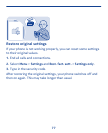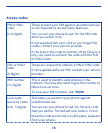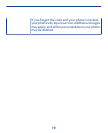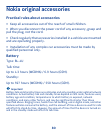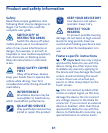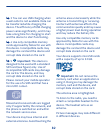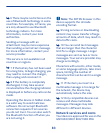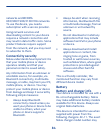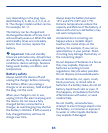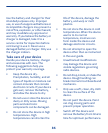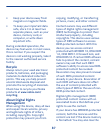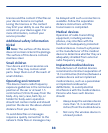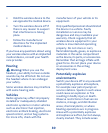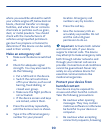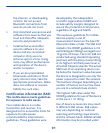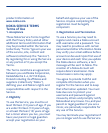
vary depending on the plug type,
identified by E, X, AR, U, A, C, K, B, or
N. The charger model number can be,
for example, AC-11.
The battery can be charged and
discharged hundreds of times, but it
will eventually wear out. When the talk
and standby times are noticeably
shorter than normal, replace the
battery.
Important: Talk and standby
times are estimates only. Actual times
are affected by, for example, network
conditions, device settings, features
being used, battery condition, and
temperature.
Battery safety
Always switch the device off and
unplug the charger before removing
the battery. When you unplug a
charger or an accessory, hold and pull
the plug, not the cord.
When your charger is not in use,
unplug it from the electrical plug and
the device. Do not leave a fully
charged battery connected to a
charger, as overcharging may shorten
the battery’s lifetime. If left unused, a
fully charged battery will lose its
charge over time.
Always keep the battery between
15°C and 25°C (59°F and 77°F).
Extreme temperatures reduce the
capacity and lifetime of the battery. A
device with a hot or cold battery may
not work temporarily.
Accidental short-circuiting can
happen when a metallic object
touches the metal strips on the
battery, for example, if you carry a
spare battery in your pocket. Short-
circuiting may damage the battery or
the connecting object.
Do not dispose of batteries in a fire as
they may explode. Dispose of
batteries according to local
regulations. Recycle when possible.
Do not dispose as household waste.
Do not dismantle, cut, open, crush,
bend, puncture, or shred cells or
batteries. If a battery leaks, do not let
battery liquid touch skin or eyes. If
this happens, immediately flush the
affected areas with water, or seek
medical help.
Do not modify, remanufacture,
attempt to insert foreign objects into
the battery, or immerse or expose it
to water or other liquids. Batteries
may explode if damaged.
85



